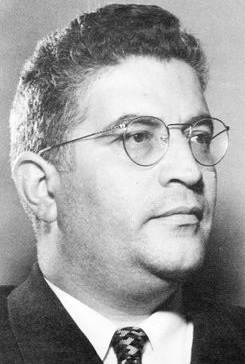Mozzafar Baghai facts for kids
Quick facts for kids
Mozzafar Baghai
|
|
|---|---|
 |
|
| Member of Parliament | |
| In office 27 April 1952 – 16 August 1953 |
|
| Constituency | Tehran |
| In office 25 April 1950 – 19 February 1952 |
|
| Constituency | Tehran |
| In office 12 June 1947 – 28 July 1949 Serving with Ahmad Razavi
|
|
| Constituency | Kerman |
| Personal details | |
| Born | 23 July 1912 Kerman, Persia |
| Died | 18 November 1987 (aged 75) Tehran, Iran |
| Political party |
|
| Other political affiliations |
National Front (1949–52) |
Mozzafar Baghai (Persian: مظفر بقائی; 23 July 1912 – 18 November 1987) was an important political leader in Iran during the 1940s and 1950s. He became well-known during a time when Iran was trying to gain control over its own oil industry. For many years, people in Iran felt that the Anglo-Iranian Oil Company was unfair. This company was partly owned by the British government. Most of the money from Iran's oil went to the company and Britain, even though the oil was found in Iran.
Baghai was a strong voice against British control. He joined with others who felt the same way, like Dr. Mohammad Mossadegh. Mossadegh was also known for speaking out against Reza Shah, who ruled Iran from 1921 to 1941. He also opposed British control of oil and their involvement in Iran's affairs. Baghai was different from many other Iranian nationalists because he had ideas that were considered very left-wing, but he was also against communism.
Contents
Forming a Political Party
Baghai started his own political group called the Toilers Party of the Iranian Nation. This party was left-wing, nationalistic, and against communism. Important people like Khalil Maleki joined him. Maleki had left another party because he felt it relied too much on the Soviet Union.
Joining the National Front
In 1949, the Toilers Party teamed up with Mossadegh and his supporters. They formed the National Front of Iran. This was a big group that brought together many Iranians. They all wanted to free Iran from foreign control, end unfair rule, and create a government that listened to its people.
In April 1951, Iran's parliament, called the Majlis, took control of the oil industry. This meant the oil now belonged to Iran. One month later, the Majlis chose Mossadegh to be the Prime Minister of Iran. The ruling king, Mohammad Reza Shah, had to approve this choice. The Shah had become king in 1941 after his father.
Political Changes and Challenges
Until 1952, Baghai supported Mossadegh. They worked together against the United Kingdom's influence. They also faced challenges from people in Iran who supported the Shah. These people did not like Mossadegh's way of leading or his plans for dealing with the UK.
A Shift in Support
From 1952 to 1953, Baghai was a member of the seventeenth Majlis. At first, he used his position to help Mossadegh's government. However, by late 1952, Baghai started to disagree with Mossadegh. He took his Toilers Party out of the National Front. Instead, he began to support the groups who were loyal to the Shah. These groups were found in the parliament, military, news, and the royal court.
When Baghai changed his support, he separated from Khalil Maleki. Maleki stayed loyal to Mossadegh and started his own group called the Third Force.
The End of Mossadegh's Government
On 19 August 1953, a major event happened. A coup d'etat (a sudden overthrow of the government) took place against Mossadegh. This coup was supported by the CIA (from the United States) and MI6 (from the United Kingdom). It succeeded in removing Mossadegh's government from power. The monarchy, or rule by the Shah, was brought back to Iran.
Because Baghai played a part in Mossadegh's government falling, many of Mossadegh's friends and the Iranian public never forgave him. Most Iranians continued to support Mossadegh. They admired his efforts to fight against foreign control and unfair rule in Iran.
Baghai passed away in 1987.
See also
- Abadan Crisis
- Mahmoud Afshartous
 | Charles R. Drew |
 | Benjamin Banneker |
 | Jane C. Wright |
 | Roger Arliner Young |

